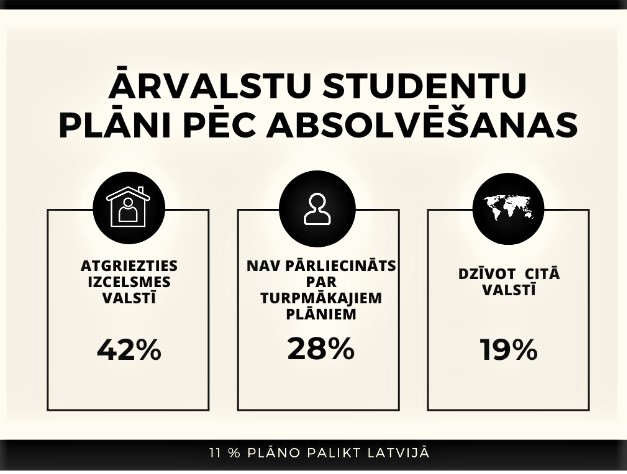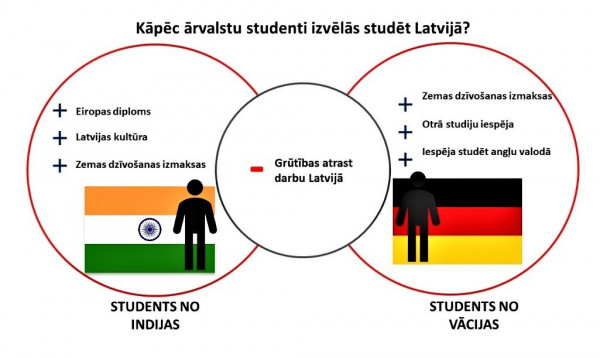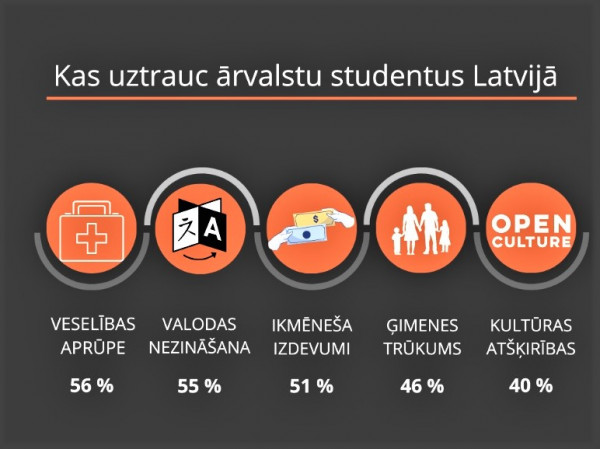Foreign students choose Latvia for studies, but not for a career

Students from India, Germany, Uzbekistan, and Kazakhstan are the biggest groups who choose Latvia as their study destination. Although the goal for all these students is the same - to get a good education in Latvia - the motives are different. Students from European countries go to Latvia to study if for some reason they have not been able to get the desired education in their own country, while students from India purposefully choose Latvia as a place to get a European diploma, says Dr. Elīna Apsīte-Beriņa's, the leading researcher of the Department of Human Geography in the University of Latvia, research.
Until the beginning of the pandemic, the number of foreign students in Latvia increased every year. Most of them are students from three regions of the world - Europe, the republics of the former Soviet Union, as well as the countries of Southeast Asia. Data from the Ministry of Education and Science show that the number of foreign students has increased by 82 percent over the past three years, reaching 10,000 at the beginning of last year, which was 20% more than in 2019 and half again as many as in 2014. In total, at the beginning of 2020, foreign students accounted for 12% of the total number of students. The Covid-19 pandemic, of course, has introduced its own corrections, the number of students coming to Latvia from abroad has decreased. E. Apsīte-Beriņa conducted a study on the pre-pandemic period.
Latvia - the second choice
Although every year more and more students from other countries choose Latvia as their study destination - for the most part it was not their first choice, but a “second chance”.
“Among other European countries, Latvia is not a popular study destination, however, there are some students from European Union countries who come to study specifically in Latvia. One of the reasons why foreign students have chosen to study in Latvia is that they have not been able to realize their intended studies in their country of origin. In turn, for others it is important to study in Latvia in order to obtain a European diploma,” explains E. Apsīte-Beriņa.

The results of the analysis of the survey of foreign students show that Latvia has often had a low priority for students from European countries when choosing a study destination. At the same time, however, they appreciate the quality of the studies offered, as well as the opportunity to study in English and live in the capital.
Assessing the total number of foreign students, E. Apsīte-Beriņa has concluded that Indian and German students are the two biggest groups who choose to study in Latvia. Latvia seems moderately attractive to students from Russia, Uzbekistan, and Kazakhstan. Like students from European countries, they value the overall quality of studies, the opportunity to study in English. In addition, they have the opportunity to speak Russian on a daily basis. The total costs of studies and living in Latvia are also highly valued. In turn, students from India and Sri Lanka come to Latvia purposefully. In addition to the reasons already mentioned, students from Asian countries value the experience of learning about another country's culture.
Riga as a destination and also studies in the Baltic region were relatively highly valued. Students from Germany rated these factors lower. Students from Germany mostly come to Latvia to study medicine, and as one of the most important factors in favor of choosing to study this field precisely in Latvia, they noted the possibility to study in English.
In the course of the research, the areas that are of the greatest concern to foreign students while living in Latvia were also explained. International students are concerned about the availability of social protection and health care during their studies.
Only 11% want to stay in Latvia
Foreign students also admit that not knowing the Latvian language at the desired level is a cause for concern. "It is often not related to everyday issues, but to opportunities to participate in the labor market. Often, due to lack of knowledge of the Latvian language, a foreign student is rejected as a possible employee,” said E. Apsīte-Beriņa.

It would be important for Latvia that a part of foreign students connect their future with Latvia and participate in the local labor market. The study shows that about half of all foreign students want to return to their country of origin after graduation, while 25% would like to move to another country to continue their studies or start a career. 11% of the surveyed foreign students would like to stay in Latvia, however, none of the surveyed students from Germany indicated a wish to stay in Latvia after graduation.
“One-fifth of the respondents indicated that they do not currently have specific plans for the future, which means that these students could potentially stay in Latvia and get involved in the labor market. Among European students, around 70% of students want to return home. In turn, a third of the surveyed Indian students want to return to India after graduation, while a quarter wants to move to another country to continue their studies or start a career,” reveals E. Apsīte-Beriņa. As the results of the study show, a relatively large part of the surveyed young people do not have specific plans for the future, which means that these students could potentially stay in Latvia and participate in the labor market, as long as the mechanisms of involvement were clear.